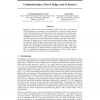Free Online Productivity Tools
i2Speak
i2Symbol
i2OCR
iTex2Img
iWeb2Print
iWeb2Shot
i2Type
iPdf2Split
iPdf2Merge
i2Bopomofo
i2Arabic
i2Style
i2Image
i2PDF
iLatex2Rtf
Sci2ools
105
click to vote
NIPS
2008
2008
Unlabeled data: Now it helps, now it doesn't
Empirical evidence shows that in favorable situations semi-supervised learning (SSL) algorithms can capitalize on the abundance of unlabeled training data to improve the performance of a learning task, in the sense that fewer labeled training data are needed to achieve a target error bound. However, in other situations unlabeled data do not seem to help. Recent attempts at theoretically characterizing SSL gains only provide a partial and sometimes apparently conflicting explanations of whether, and to what extent, unlabeled data can help. In this paper, we attempt to bridge the gap between the practice and theory of semi-supervised learning. We develop a finite sample analysis that characterizes the value of unlabeled data and quantifies the performance improvement of SSL compared to supervised learning. We show that there are large classes of problems for which SSL can significantly outperform supervised learning, in finite sample regimes and sometimes also in terms of error converge...
Information Technology | NIPS 2008 | Semi-supervised Learning | Situations Unlabeled Data | Unlabeled Data |
Related Content
| Added | 29 Oct 2010 |
| Updated | 29 Oct 2010 |
| Type | Conference |
| Year | 2008 |
| Where | NIPS |
| Authors | Aarti Singh, Robert D. Nowak, Xiaojin Zhu |
Comments (0)

